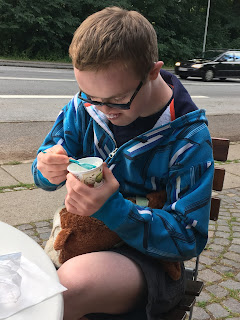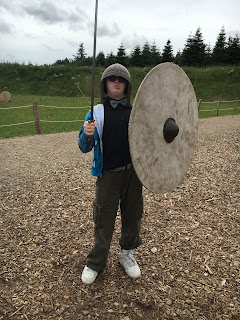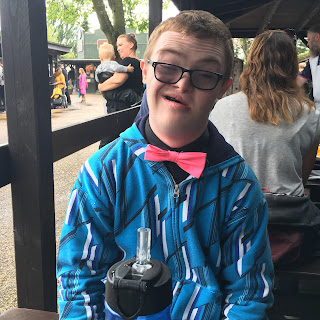I recently had the privilege of traveling to Europe with my son with Down syndrome. He had flown once before, to Texas to visit family, but never as far as Europe. This was new territory.
Ben was surprisingly easy to travel with. He has an angel's patience when he is not sure what is going on, and he is happy to sit and wait for the next leg of the journey. This one started at Boulder Table Mesa Park and Ride with a bus to the airport. Note the modest amount of luggage -- we prefer to travel light.
We each brought only one jacket along, and Denmark was surprisingly cold this summer, so almost every outdoor picture features Ben in the same jacket.
Every day on the trip, one of the stuffed animals Ben brought along had a birthday. In this case it was Ben the Bear (stuffed animal in the background is actually a Colorado Christian University Cougar, but Ben has named him "Ben the Bear").
We flew from Denver to Toronto to Copenhagen, and thankfully Trans-Atlantic flights are equipped with nice movie choices. Ben COULD NOT sleep on the trip. COULD NOT. So he pretty much watched 8.5 hours of movies on the last leg of the trip. I think it was Zoo-topia, over and over and over again.
Ben the bear was well behaved, and very attentive to the movies as well.
In Toronto where we sat for 5 hours, we got a wheelchair for Ben and that made moving about the airport easy and seamless. When I tried to do the same in Newark, the airlines required that a person FOR SAFETY REASONS push the wheelchair for me the entire time. We were not allowed to just get a chair and for me to push it on my own. (Read - slight annoyance. I find the safety risk a red herring).
An iPad is a great thing to travel with. Ben has a bowling game he likes to do on the iPad. Kept him busy for hours of waiting.
Danes have real sweet tooths, and icecream is a super nice treat in Denmark. We had it on several occasions. Ben is a big icecream fan. So far, Denmark is awesome.
Feeding ducks was a past time of my childhood, also one Ben was happy to engage in.
This one playground was really cool. I would have had a picture of Ben, but apparently I did not take any. This 'playground' is for ages 14 and up. It is actually different exercise equipment out in public at a park near numerous trails you can walk or jog on. This particular piece of equipment works on upper body pull ups, but there were many others. Ben loved this "playground".
We also played stylites. And in this case, I have to brag on my new walking shoes.
And on Benjamin Nike (Benjamin the victorious --- with Ben the dog in his hand). Why did I later go to Greece when columns were right here to be gotten in Denmark? I am not sure.
Taking Ben to the beach was a treat. The Danish west coast has amazing beaches. And amazingly just like my older kids who did not grow up with the ocean either, Ben got his feet wet while he was standing at the edge of the water waiting for me to go in and get a little bit more wet. He did not notice that the waves were sneaking up on him.
What is Denmark without a little viking? We explored part of Ben's heritage by going to the Viking Center in Ribe.
Sleep like a viking.
Sail like a viking.
Did I mention that Ben the dog was along too? And that he also had near-daily birthdays?
We did much walking along lush trails like this one. Note the Danish sky here, and above. For the most part it was cold and borderline wet or raining. The Danish summer seemed to afford us only shades of gray. Some days were light gray, some medium gray, and some dark gray. :)
Of course, a trip to Legoland.
This ride Ben did 'all by himself', and very happy and proud he was. I had trouble on the Egyptian ride, another very lame ride, where he was not allowed to sit by himself (decided a young woman who was monitoring these sorts of thing.) Seemed a little discriminatory to me, I said, since he is 19, but she did not budge, and it was not a battle I was prepared to ruin the day with.
We visited the wild west as represented in Legos.
And had icecream, though that is not quite apparent from this picture which is post icecream clean up.
Yup... the Legowild west, and that, we explored with Ben the dog, who was along in the suitcase.
Isn't Ben the dog cute? Note Ben the dog is any stuffed dog owned by Ben -- and there are many of them.
Ben was a super gem on the way back. He even SLEPT on the plane after a few movies.
Finally, we were six hours late in Newark because of lost luggage and delayed flights. Ben just put his backpack on the ground and put his head on it and tried to rest (with Ben the Dog).
Ben -- the perfect travel mate.















































